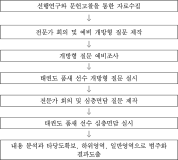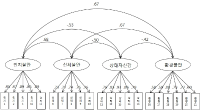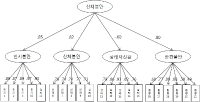PURPOSE This study aimed to a) develop suitable screening tools for identifying gambling severity in Korea and b) explore factors that affect the gambling severity index in order to prevent Korean sports betting users from easily falling into gambling addiction, thus providing practical and useful guidelines in this regard. METHODS This study examined Korean sports fans who had experiences of participating in sports betting (Sports Toto), a legal sports betting system in Korea. Toward this end, an online survey was conducted from May 10 to June 25, 2022. A total of 214 questionnaire results, excluding 23 who gave insincere and/or incomplete answers, were analyzed for normal distribution through skewness and kurtosis, and subscale scores were calculated after performing exploratory factor analysis and reliability analysis using Cronbach’s α. RESULTS A psychological gambling severity index and behavioral gambling severity index were developed based on a stepwise regression analysis, which was conducted using the demographic characteristics of domestic sports betting participants and their lifestyle habits (e.g., smoking and drinking, problem gambling severity index, self-control scale, and gambling expectation scale). CONCLUSIONS First, factors affecting the psychological gambling severity index were identified (having a job, job stability, and security) along with lifestyle habits (smoking and drinking). Second, gender, occupational characteristics, full-time employment, confidence in self-control, and desire for self-improvement were indicated as significant factors that influenced the behavioral gambling severity index.

The purpose of this study was to develop and validity Competitive State Anxiety Scale for Taekwondo Form athlete(CSATF). The participants were composed of the 48 Taekwondo Form athlete to explore sub-factors of Competitive State Anxiety for Taekwondo Form athlete. The data were collected by an open-ended questionnaire and interview. The participants were composed of 257 national Taekwondo Form athlete to develop Competitive State Anxiety Scale for Taekwondo Form athlete. This 157 athlete data were used for items analysis, reliability analysis and exploratory factor analysis. And 100 athlete data were utilized for confirmatory analysis. Also convergent validity, discriminant validity, predictive validity latent mean analysis of CSATF were performed The results of this study were as follows. Firstly, the results revealed that the four general dimensions were identified such as cognitive anxiety, somatic anxiety, state of confidence, environmental anxiety. Secondly, CSATF comprised cognitive anxiety(5 item), somatic anxiety(5 item), state of confidence(5 item) and environmental anxiety(6 item). Thirdly, convergent validity, discriminant validity and predictive validity, the multi-group analysis according to gender examined validity of CSATF.



